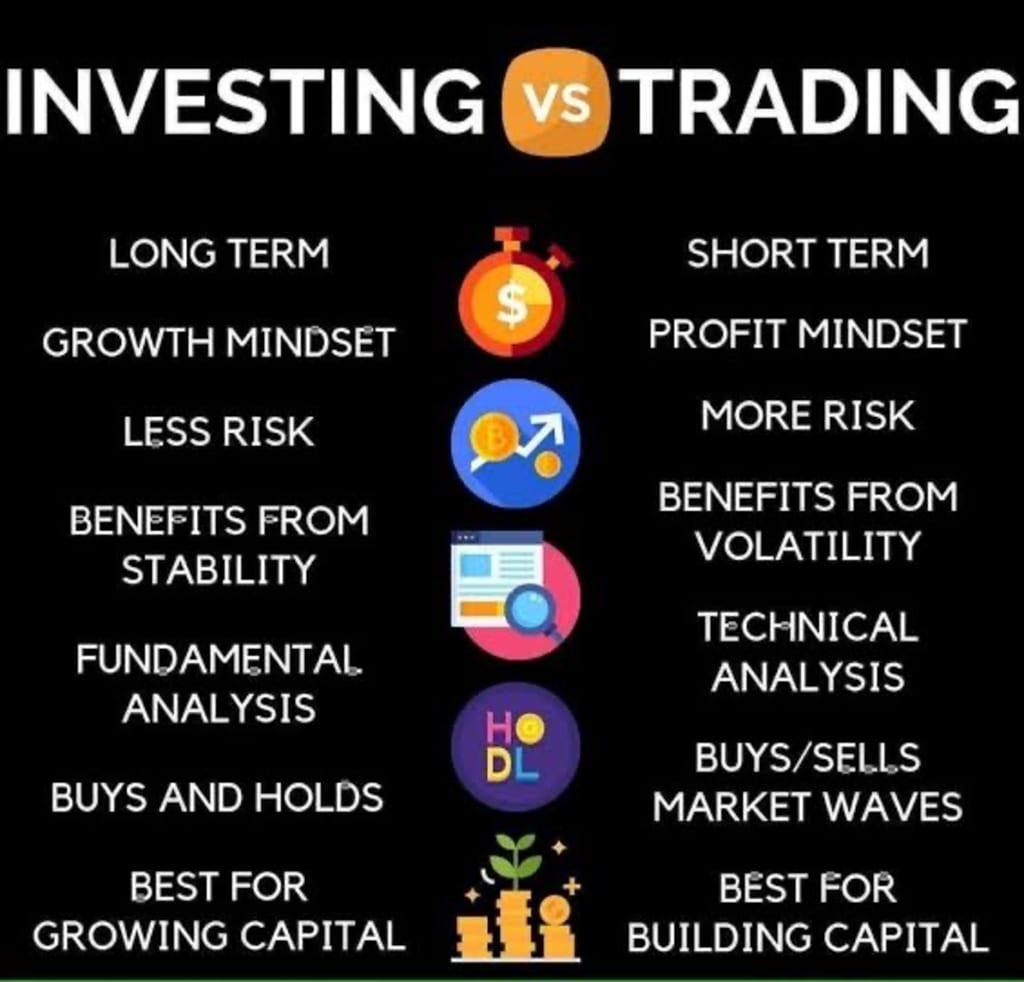Investing vs Trading what is the Difference
Investing and Trading

Investing and trading are both ways to participate in the financial markets, but they have different objectives and time horizons.
Investing is the act of buying and holding assets for the long-term with the goal of generating returns over a period of several years or decades. Investors seek to build wealth over time by purchasing assets such as stocks, bonds, mutual funds, and real estate, and holding them through market cycles. Investors typically focus on the fundamentals of the assets they invest in, such as earnings, dividends, and the overall financial health of the company.
Trading, on the other hand, is the act of buying and selling assets for the purpose of making short-term profits. Traders typically hold assets for a shorter period of time than investors, sometimes just minutes or hours, and focus on technical analysis and market trends to identify opportunities to buy and sell assets. Trading can be done in a variety of markets, including stocks, options, futures, and currencies, and involves higher levels of risk than investing.
There is a question which is sometimes asked by those new to the financial markets, and even occasionally debated by experienced participants. That question is how one differentiates between trading and investing. Because both trading and investing – when one considers them from the perspective of the financial markets – are performed in very similar fashions, they are often thought of as interchangeable actions.
In my book, The Essentials of Trading, I followed along with this basic theme by introducing the idea that what differentiates the two is scope definition. Both trading and investing, after all, are at the most simple of levels application of capital in the pursuit of profits. If I buy XYZ stock I expect to either see the price appreciate or earn dividends – perhaps both. What separates trading from investing, however, is that generally in trading one has an exit expectation. This might be in the form of a price target or in terms of how long the position will be held. Either way, the trade is seen to have a finite life. Investing, on the other hand, is more open-ended. An investor will buy a company’s stock with no predefined notion of when he or she will sell, if ever.
We can use examples to help demonstrate the difference. Warren Buffet is an investor. He buys companies which he sees as somehow undervalued and holds on to his positions for as long as he continues to like their prospects. He does not think in terms of a price at which he will exit the stock. George Soros is (or at least was while he was still actively running his hedge fund) a trader. His most famous trade was shorting the British Pound when he thought the currency was overvalued and ready to be withdrawn from the European Exchange Rate Mechanism. The position he took was based on a specific circumstance. Once the Pound was allowed to float freely, and quickly devalued in the market, Soros exited with a handsome profit. That meets the criteria of having a predefined exit, making it a trade, not an investment.
There is another way one can define trading as set against investing, though. It has to do with the manner in which the applied capital is expected to produce a return. In trading the appreciation of capital is the objective. You buy XZY stock at 10 expecting it to go to 15 and thereby produce a capital gain. If dividends or interest are paid out along the way, that is fine, but likely only a minor contribution to the expected profits.
In summary, investing is a long-term strategy focused on building wealth over time, while trading is a short-term strategy focused on making profits quickly by buying and selling assets. Both approaches have their pros and cons and may be appropriate for different types of investors depending on their financial goals, risk tolerance, and time horizon.
About the Creator
Olauyi Michael
Words matter is the digital realm, and words are the key to unlocking your web presence and solidifying your brand’s voice and foundation.
Enjoyed the story? Support the Creator.
Subscribe for free to receive all their stories in your feed. You could also pledge your support or give them a one-off tip, letting them know you appreciate their work.






Comments
There are no comments for this story
Be the first to respond and start the conversation.